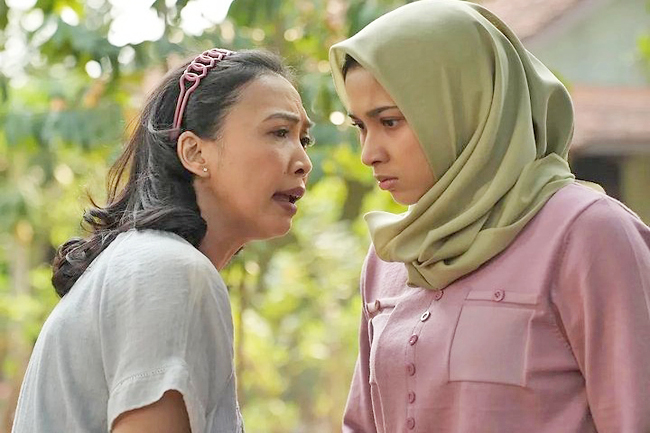In Islamic tradition, the cleansing and preparation of the deceased is a deeply sacred process that forms part of the broader communal obligation known as fardhu kifayah, which refers to the collective responsibility of ensuring these rites are performed.
If a few members of the community fulfil this obligation, the duty is lifted from the rest. It honours the deceased and prepares them for the afterlife – a profound process that serves as the foundation for The Corpse Washer.
Now streaming on Netflix, The Corpse Washer takes this tradition and uses it as the backdrop for a chilling tale of supernatural mystery.
Directed by Hadrah Daeng Ratu and written by Lele Laila, the film centres on Ibu Siti, the only corpse washer in her village, and her daughter, Lela, who is reluctant to inherit her mother’s legacy.
Ibu Siti takes great pride in her work, regarding it as a noble tradition passed down through generations. She hopes Lela will embrace the family legacy, but her daughter’s aspirations lie elsewhere.
For Lela, their inherited duty within the realm of the dead feels more like a burden than a calling. Like her mother, she possesses a sensitivity to the supernatural, a gift she struggles to accept.
Though she was trained in the rituals from a young age, the thought of continuing without her mother’s guidance feels almost unimaginable.



The film starts strong, drawing viewers into the world of the mother and daughter as they perform the rituals of cleansing the deceased. For those who have experienced loss, the ritual feels both familiar and profoundly moving, striking a delicate balance between solemnity and ease.
Set in a rural, conservative Indonesian village, the film draws viewers into its world with a setting that feels both authentic and unembellished, reflecting the simplicity of its environment.
The depiction of the rituals, performed with limited and rustic facilities, adds a raw authenticity to the narrative.
At the same time, it prompts reflection, perhaps highlighting cultural differences, as one might wonder about the practicality of having only a single individual tasked with such a significant duty in a Muslim community.
When Ibu Siti dies under mysterious circumstances, Lela’s life takes a dark turn. Not only must she take on her mother’s responsibilities, but she also becomes determined to uncover the truth behind her mother’s death.
Beyond the mystery, the film weaves in an underlying narrative that explores a sadly familiar aspect of many communities: gossip and baseless accusations. As we follow Lela in her attempt to piece together the grim events unfolding around her, a darker layer emerges – the community’s unsavoury attitudes and a history of suspicion and scapegoating. This toxic pattern, it seems, may be doomed to repeat itself, leaving a trail of consequences marked in blood.
At certain points, as the film delves into various themes – such as the responsibilities of a Muslim and the actions of the community – it begins to lose some of its initial impact.
Despite starting strong, the narrative gradually veers into territory more reminiscent of a telemovie drama, where the emotional stakes feel heightened but less grounded in the world it initially set out to build.
The pace of the film is quite brisk, which at times leaves viewers feeling as though they have to catch up with the unfolding narrative threads. These threads are often introduced sporadically throughout the movie, making the storyline feel disjointed.
While some characters become increasingly irritating, it’s hard to view this as a deliberate narrative choice to serve the story. Instead, it somewhat drags the film down, serving as a clunky obstacle for the protagonist that feels more like a plot convenience than a meaningful challenge.
The Corpse Washer delivers effectively in atmospheric horror. Given the film’s title, it’s easy to predict when and where most of the scares will unfold.
Yet, just when you think you’ve figured it out, you’ll find yourself jumping out of your seat. The shadowy mortuaries, dimly lit village streets, and unsettling sound design – including whispers and eerie silences – are all used effectively.
While grounded in real-life practices, the film offers a unique perspective that adds authenticity.
For Muslim audiences, the depiction of these rites might evoke a mix of respect and discomfort, while non-Muslim viewers gain a thought-provoking glimpse into a sacred tradition.
The film leans heavily on jumpscares, which, though effective, occasionally disrupt the slow-burning suspense. The pacing eventually falters in the middle, with a supposedly climactic revelation that was one; can be seen a mile away, felt very rushed.
In the end, The Corpse Washer may lose a bit of its emotional punch as it shifts from a gripping mystery to a more melodramatic drama, but it still delivers on atmosphere and cultural depth.
The eerie visuals, coupled with a strong sense of place, linger long after the film has ended.
For those who enjoy stories that mix the supernatural with the complexities of family and community, The Corpse Washer offers a serviceable experience.
While it may not be the most memorable film, it does provide an intriguing watch for a horror movie night with the family.
The eerie atmosphere and cultural elements make it a decent choice for those looking to delve into something a bit different, though it doesn’t quite reach the heights it sets out to achieve.
Still, for a night of suspense and mystery, it does the job. – Wardi Wasil


